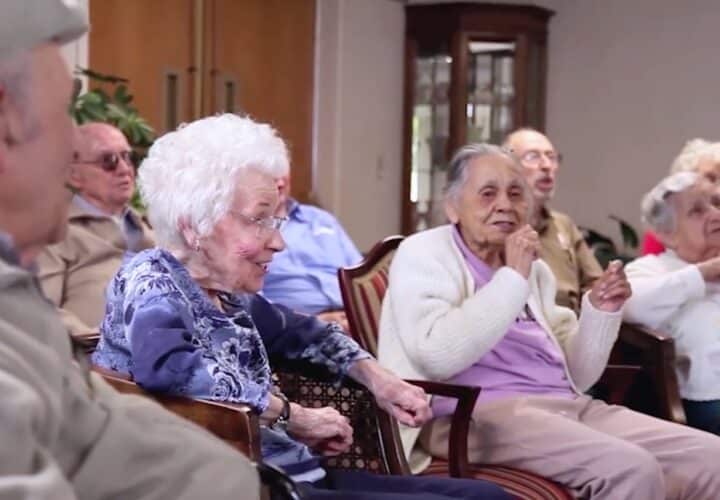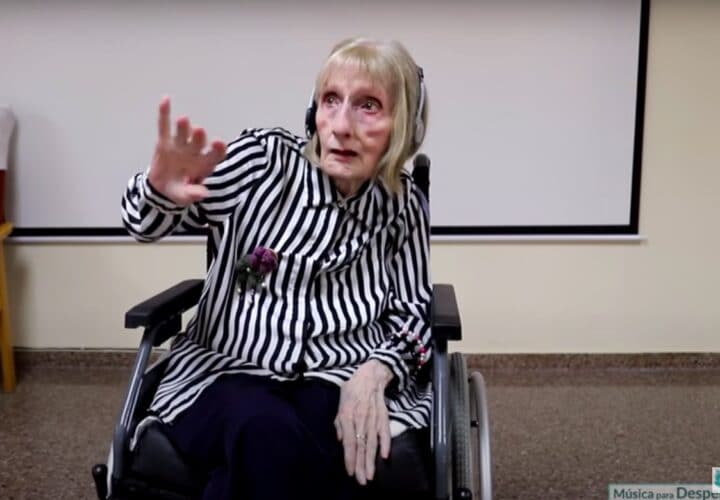Grooving to the oldies helps people with dementia tap into their memories — and, studies show, it eases agitation caused by changes in routine.
While other cognitive functions and memories fade away with dementia, musical memories are last to go. Music transports patients to a comfortable moment in the past. As a result, familiar music eases agitation and other psychiatric symptoms.
But not everyone knows how to incorporate music into a person’s routine at home. Now, many organizations offer music-based tools — apps and MP3 players — that streamline the process. Reducing psychiatric symptoms with music also eases the burden of stressed out caregivers.
Melissa Robinson is the coordinator of Alzheimer’s Society Toronto Music Project which sends out free personalized MP3 players to people with Alzheimer’s across Canada. “Personalized music allows people who are living with dementia to recall those memories that are near and dear to their hearts,” Robinson told Being Patient.
How music helps people with dementia
Alzheimer’s disease damages the areas of the brain involved in processing memory. Why do musical memories stay?
Concetta Tomaino, executive director (and co-founder) of the Institute for Music and Neurologic Function and board member of the Music & Memory. Dementia damages the parts of the brain that process environmental information. Tomaino explained in a Being Patient LiveTalk that this causes a lot of agitation and confusion.
“However, familiar music initially gets processed in deeper areas of the brain more resilient networks in the brain that are connected to long term memory retrieval,” Tomaino told Being Patient. “Emotional responses don’t get as damaged because of chemical changes in the brain [during dementia].” These areas still recognize the music, stimulating the brain from the inside.
#1: Find the right music
Robinson makes sure to ask what kind of music the person with dementia liked to listen to earlier in life. “Choose music that they grew up listening to, not something that they would listen to now, because they may not remember it and may not connect as well,” Robinson said.
Sometimes caregivers don’t know what songs the person with dementia liked listening to. Robinson suggested loading up on popular songs from their teenage years and 20s. In some cases, people may need to dig for songs from other countries in other languages. “We have whole genres of music in our library, including multicultural music as well,” Robinson said. In Canada, the Music Project has collected a lot of highly requested cultural music, which could be hard to find elsewhere. Evidently, these songs make all the difference for some patients.
“Sometimes when people are living with dementia, they have no connection with their caregivers or with their loved ones at all, because they don’t talk,” Robinson said. “As soon as they hear a certain type of music, they perk up, their eyes light up, and they start singing along to the music.”
#2: Incorporate lyric prompting
Singing alongside familiar music may have additional benefits for people living with dementia. Rachel Francine is the CEO of SingFit, a company that developed a music memory platform to help caregivers and occupational therapists deliver these therapeutic music activities. Their app uses lyric prompts — a voice that speaks the lyrics which the patients will then sing.
One of the issues with this form of therapy may require a trained, licensed music therapist. “There’s only between seven [thousand] and 10,000 music therapists in the country.” Francine said, adding that she wanted to make this form of therapy widely available by making the SingFit platform.
“The platform allows evidence-based music therapy practice to happen and be delivered by other kinds of healthcare professionals, as well as caregivers.”
As of now, the app costs $9.99 per month for caregivers. This platform is already in use across nursing homes in the U.S. and will be rolled out this year in the United Kingdom.
#3: Use music to ease unfamiliar transitions
Justin Russo, the program director of the Music & Memory. This non-profit trains professional caregivers and care staff to create personalized, custom music playlists and provides equipment MP3 players and headphones to long-term care communities.
Routine is very important for people living with dementia. A doctor’s appointment breaks from the daily routine, leading to anxiety or agitation. Russo told Being Patient that music reduces irritation and anxiety in unfamiliar situations.
“There are a number of points throughout a person’s day where you can deviate from a routine,” Russo said. “Music can be really helpful, just to get them through those times.”
These playlists also help calm the patient after a virtual family visit. During lockdowns, the Music & Memory team encouraged family members to use video calls to keep up with their loved ones. But After these video calls ended they noticed that patients would become distressed.
“One of the things that we actually were teaching at the time, was to use music in conjunction with video conferencing, to help people transition when they were getting off those video calls with family members,” Russo said. Having the family member and patient both listen to the same music at the end of the call, they could help improve the process.
The familiarity of musical memories
The songs from a person’s teenage years and twenties evoke strong emotional memories. Listening and singing along to these familiar tunes eases agitation for people with dementia. It is especially helpful for easing the tension of transitioning to an unfamiliar situation, like a doctor’s appointment.
UPDATE 4 April, 2023: The price of SingFit has been corrected. The app is $9.99 per month — not $999.00.





